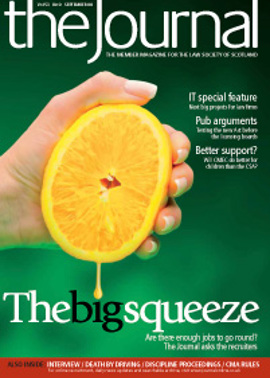Tackling the sporting bodies

The recent High Court case involving Dwain Chambers and the British Olympics Association (BOA) serves as a reminder of the substantial part the law has to play in the administration of sport and sporting events.
Comments by an eminent English silk involved in the case also highlight an important distinction between the Scots and English systems for review of the decisions of sporting bodies. David Pannick QC (The Times, 31 July 2008) recorded the “first principle of sports law” thus: “governing bodies are not public bodies whose decisions are subject to judicial review”.
The Scottish courts have long denied that the availability of the supervisory jurisdiction of the Court of Session rests on any distinction between public bodies and private: West v Secretary of State for Scotland 1992 SC 385. Under that jurisdiction, the courts may regulate the process by which decisions are taken by any person or body entrusted with a jurisdiction, power or authority, in order to ensure that the person or body does not exceed or abuse their jurisdiction, power or authority, or fail to do what is required.
Sporting bodies in Scotland
In Scotland it has long been clear that decisions of sports bodies may be subject to judicial review. For recent examples, see Crocket v Tantallon Golf Club 2005 SLT 663. The authorities highlight the need for a tripartite relationship between (1) the person or body delegating the jurisdiction, power or authority; (2) the person or body to whom it was delegated; and (3) the person in respect of whom the power was to be exercised. Having said that, Lord Reed in Crocket referred to the concept of the tripartite relationship only as a paradigm. It was not “to be applied inflexibly, as if it were a Procrustean bed which every situation must be forced to fit”.
In Wiles v Bothwell Castle Golf Club 2005 SLT 785, Lord Glennie, relying on the decision of Lord Reed in Crocket, but not necessarily agreeing with all of Lord Reed’s analysis, held that “It is now clearly established that proceedings in court by a member to vindicate his rights are, in Scotland, properly to be taken by way of judicial review”. As to the willingness, or otherwise, of the courts to intervene, Lord Glennie said: “Whatever may have been the position in the past, I consider that it is wrong today to draw a clear line between, for example, on the one hand, trade associations and, on the other, social or sporting clubs; and say that in the former case the courts will be ready to intervene on procedural matters whereas in the latter they will not.”
It appears clear, therefore, that whilst the tripartite test in West remains useful, it is not determinative, and the courts will look at the nature and the circumstances of the decision.
However, the absence of a tripartite relationship altogether will preclude judicial review. In Fraser v Professional Golf Association 1999 SCLR 1032, Mr Fraser sought judicial review of a decision of the PGA that he failed an element of its admission examination, meaning that he was refused entry. He sought to review the decision of the examiner, upon whom, he said, a decision making jurisdiction had been conferred, creating the necessary tripartite relationship. Lord Eassie agreed with the PGA’s submissions that, by delegating a decision to an employee or agent, they had not created a tripartite relationship, and distinguished that delegation from the establishment of examiners as a body possessing an identity outwith the association comprising the PGA.
Nature of the argument
In the end, one wonders whether the fact that the decisions of sporting bodies may be judicially reviewed in Scotland would have been a distinction without a difference for Dwain Chambers. Although the full written decision of the High Court is not available at time of writing, it appears that Chambers’ argument was with the byelaw of the BOA itself (which he said was in restraint of trade), rather than its application by a body to whom “the power to decide” had been delegated. If those were the facts, the Scottish courts may not have entertained an application for judicial review.
It will be interesting to see whether the supervisory jurisdiction will have a part to play in the Commonwealth Games in Glasgow in 2014. Whilst that event will have the usual network of decision makers and appellate bodies to deal with issues arising, there is authority that it is not possible to contract out of the supervisory jurisdiction, since to do so would be contrary to public policy: St Johnstone FC v SFA, 1965 SLT 171. Or should lawyers concentrate on involvement as sporting participants and spectators?
In this issue
- Discrimination is discrimination
- Servitudes and shop fronts
- DLA Piper in expansion mode
- At your service
- ARTL and secure signatures
- Sending a unified message
- Facing the squeeze
- Room for doubt
- Dealing with our older casework
- Regime change
- Risky business
- Drink problems
- Consumer credit licence changes
- RFPG's online trainee service
- Adult incapacity: new caution scheme agreed
- Appreciation: Sandy McIlwain
- Stair Memorial marks its 21st
- "Gateway" opens its doors
- Facing the lean years
- On the road again
- E-legal @ Nothing but the Net
- IT - ever onwards
- Testing competency
- A Wise decision
- Name calling
- Diverse guidance
- Tackling the sporting bodies
- Keeping it legal
- Scottish Solicitors' Discipline Tribunal
- Website reviews
- Book reviews
- Charging the death offences
- Another hoop to jump
- An idea whose time has gone
- Society launches home report solution






